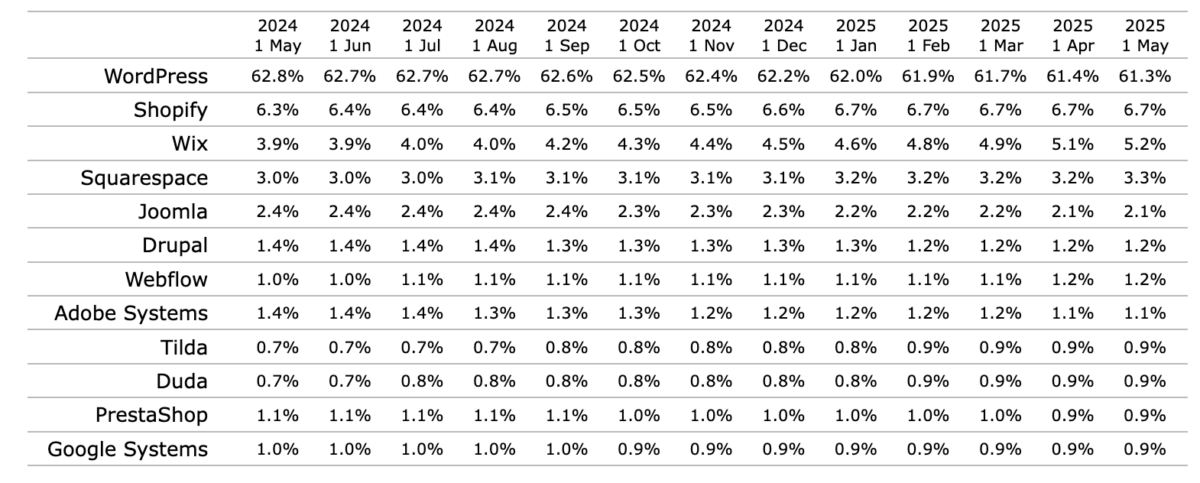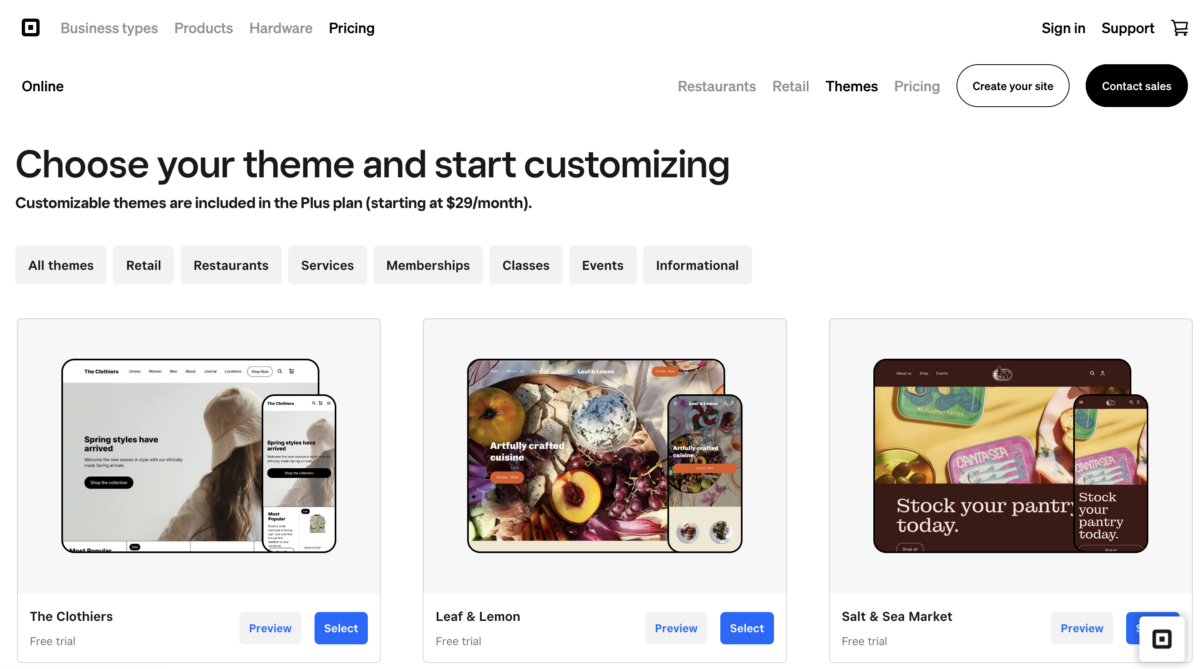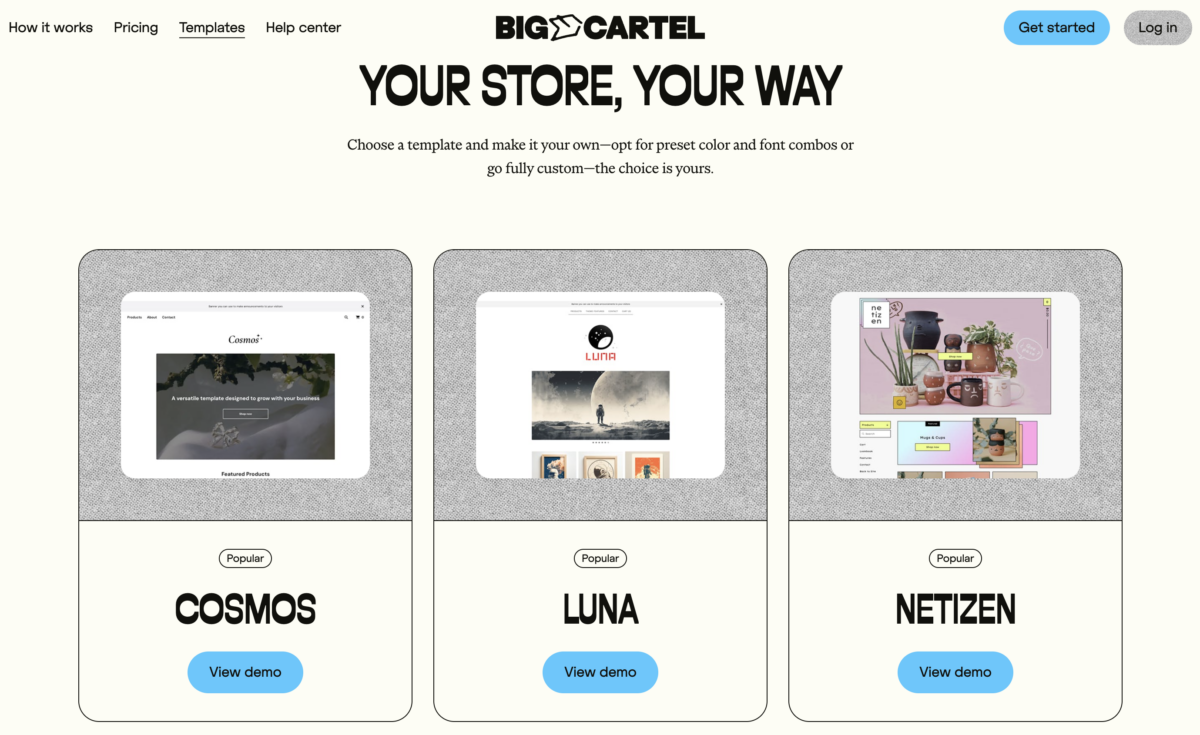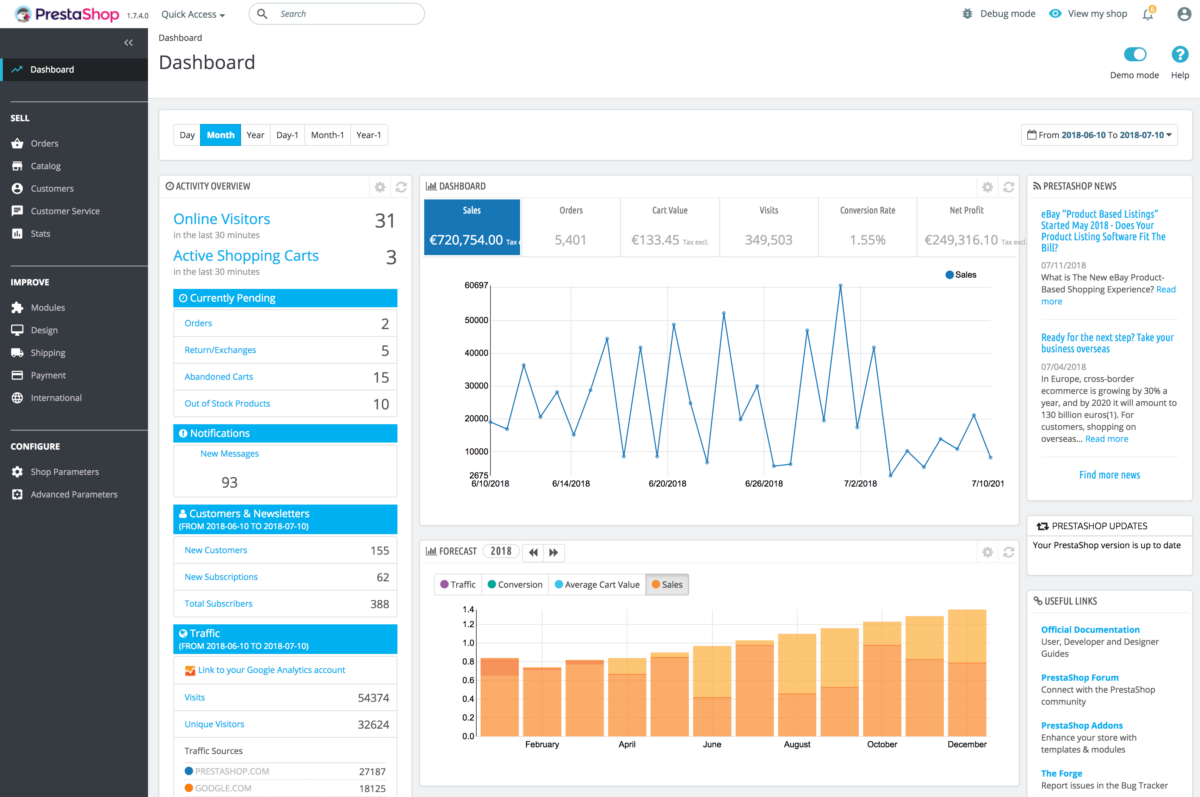In the event you personal an e-commerce retailer otherwise you’re fascinated by beginning one, it’s essential to consider the way you’ll retailer and show the positioning knowledge. In spite of everything, even the smallest e-commerce store has product images, descriptions, pricing data, stock, and extra. In different phrases, in contrast to easy web sites targeted on content material creation like a weblog, there’s plenty of uncooked knowledge within the e-commerce area that you just’ll must assist your on-line presence.
Equally, it’s essential to make sure that your e-commerce website is well-organized and supplies a consumer-friendly consumer expertise. In any other case, folks can have no actual incentive to buy items out of your retailer and can flip to different on-line companies who’ve a extra interesting buyer expertise. There could also be exceptions for extremely specialised gadgets, however a disorganized web site is unlikely to take off in any other case.
Essential to website organizations is an efficient option to handle your website’s content material. For some giant outlets, the reply could also be a custom-made resolution. Nevertheless, for smaller outlets, an ecommerce CMS is usually the reply.
What’s an Ecommerce CMS Platform?
The time period CMS stands for Content material Administration System. That is an applicable identify that displays essentially the most primary perform of the CMS — managing the digital content material of an internet site. In the event you use a CMS on your website, it should set up all of your website knowledge. It might additionally interface with different functions by means of APIs and Integrations.
Usually talking, utilizing an ecommerce CMS signifies that your web site will want little to no {custom} code. In different phrases, your net developer received’t have to jot down a pc program to carry out content material administration capabilities. As an alternative, you’ll be able to principally drag and drop content material into the backend of your web site. Executed proper, a CMS will permit for the seamless operation of your web site.
Why are CMS Platforms Invaluable for E-commerce In the present day?
As I already talked about, a CMS supplies an easy-to-use platform with a user-friendly interface that holds your web site collectively. However there are extra advantages than merely getting the job achieved. The truth is, I’d argue that utilizing a CMS as a substitute of {custom} code on your e-commerce website is invaluable.
In the end, the no-code nature of a CMS makes it simpler than ever for somebody to arrange an e-commerce website. That’s, virtually anyone can construct an internet site this manner. Whereas skilled net improvement is useful, persevering with to pay professionals to replace each side of your website, corresponding to including merchandise or altering costs, may be uneconomical. That is very true to start with when you might have little or no revenue margin.
On a associated be aware, CMS utilization permits virtually anybody to run an internet site. In case your e-commerce retailer is simply beginning, it’s simple to be taught the few expertise you’ll want for on a regular basis upkeep. And with the low Construct and upkeep prices, you can begin a store with virtually no cash.
Equally, the power to make modifications to your website shortly may also help enhance profitability as you reply to market forces. If the newest provider charges are crushing your revenue margin, for instance, then you’ll be able to regulate costs accordingly. Likewise, including a backorder message to a preferred merchandise web page helps hold clients knowledgeable. With transparency being so essential to right now’s customers, an ecommerce CMS is more and more crucial to your store’s success.
Understanding the CMS Market Panorama
Earlier than we dive into particular platform suggestions, it’s useful to know how broadly adopted every CMS is. This chart from W3Techs supplies a snapshot of present CMS market share developments:

Observe that WordPress isn’t essentially used for ecommerce, however it’s by far the most well-liked CMS. After we take WordPress out of the equation and as a substitute use these which can be using its ecommerce resolution WooCommerce, the highest ecommerce CMS platforms seems to be like this:


Selecting the Proper Ecommerce CMS Platform to Construct Your On-line Retailer
Clearly, selecting the correct CMS is an enormous determination. With all of the competing packages on the market, it may be powerful to resolve between the alternate options. Worse, altering your thoughts later means you’ll need to migrate knowledge from one platform to a different – which may take plenty of time and requires your retailer to be offline through the course of.
As you learn by means of this record, contemplate what options you want proper now. Then, take into consideration how effectively a CMS can accommodate your present wants and any added necessities within the close to future. When you’ve narrowed down the choices, a remaining determination can be a lot simpler.
All-in-One Hosted Ecommerce Platforms (SaaS)
These are turnkey options that embody internet hosting, CMS, and ecommerce instruments in a single package deal. Perfect for many who wish to launch quick with minimal technical overhead.
1. Shopify


Shopify is likely one of the hottest e-commerce CMS choices proper now. The truth is, based on the corporate, round 10% of e-commerce within the US is transacted on Shopify. When you think about that Amazon and another mega-sites run their very own CMS, it’s simple to see that Shopify has a really giant footprint.
Contemplating Shopify’s capabilities, this isn’t stunning. Like all different CMS packages, Shopify holds your net content material. Nevertheless, it does much more. Utilizing Shopify, you’ll be able to fulfill orders, handle stock, and get detailed analytics knowledge to assist develop your on-line enterprise. As well as, you need to use it with half a dozen gadgets on the market or many 1000’s as a result of Shopify is nearly endlessly scalable. You possibly can even deal with worldwide orders.
Another excuse you may select Shopify is that it’s primarily an all-in-one resolution for working what you are promoting’s on-line and backend components. For example, you’ll be able to leverage Shopify Funds on your website and likewise get a terminal for the brick-and-mortar location or commerce present sales space. This omnichannel flexibility helps you broaden what you are promoting horizons. Lastly, there are highly effective advertising and marketing instruments included that can assist you succeed.
Shopify provides built-in Search engine optimisation instruments like editable title tags, meta descriptions, and automated sitemaps. Its mobile-optimized themes and quick load occasions additionally assist excessive Core Net Vitals scores.
Pricing: Plans begin at $39/month for the Primary plan, with Superior plans reaching as much as $399/month. Shopify Plus, designed for enterprise options, begins at roughly $2,000/month.
2. BigCommerce


You probably have a number of storefronts, try BigCommerce. That’s as a result of you’ll be able to handle a number of websites from the identical account, saving you money and time. Characteristic-wise, BigCommerce is admittedly versatile. For example, you get the usual ecommerce CMS key options like order monitoring, analytics, and content material administration. There’s additionally vital assist for omnichannel gross sales like native shops and different web sites, together with eBay or Amazon.
Is Your LinkedIn Not Delivering Outcomes?
Simply launched: my new guide to assist professionals, entrepreneurs, and enterprise homeowners maximize LinkedIn for actual development.
With years of LinkedIn experience, Maximizing LinkedIn for Enterprise Development provides actionable steps to construct your model, broaden your community, and drive outcomes.
Begin leveraging LinkedIn like by no means earlier than—seize your copy now! Click on the quilt or button beneath to purchase on Amazon.


Corporations which have each vital written content material and a product line must also contemplate this platform. That’s as a result of they provide an API and WordPress integration. Professionals who weblog and provide items or companies by means of their web sites are nice examples of entities that may profit from this function.
With that stated, though BigCommerce permits you to hyperlink together with your fee supplier, they don’t course of funds. So, you’ll want a separate fee supplier like PayPal or a bank card fee processing settlement to receives a commission. Additionally, you’ll be able to’t print delivery labels from the CMS. As an alternative, you’ll be able to examine their charges software to search out the perfect deal.
BigCommerce contains native Search engine optimisation options corresponding to {custom} URLs, microdata, and sitemaps, plus it’s one of many quickest SaaS ecommerce platforms, optimized for each desktop and cell efficiency.
Pricing: The Customary plan is priced at $39/month. The Plus plan is $105/month, and the Professional plan begins at $399/month, with further charges primarily based on gross sales quantity. Enterprise plans are custom-made primarily based on enterprise wants.
3. Wix


Wix is an easy drag-and-drop website builder with primary options. Nevertheless, Wix has some aggressive options when in comparison with equally positioned CMS platforms. For example, Wix has a really excessive degree of safety for the websites it hosts. You possibly can promote print-on-demand gadgets and do cross-border transactions. And maybe most significantly, Wix helps drop delivery. The truth is, that is very easy to do on a Wix website.
One other distinction is that Wix has an API and omnichannel gross sales capabilities. You possibly can even get buyer concentrating on and purchaser profiles, which helps fine-tune your technique. Due to this fact, you might have plenty of flexibility with minimal complexity. There’s rather a lot to like about that set of options.
Wix supplies strong Search engine optimisation assist with customizable meta tags, structured knowledge markup, and integration with Google Search Console. Its efficiency has improved considerably, particularly for cell.
Pricing: Wix provides a free plan with restricted options. Premium plans embody: Gentle at $17/month, Core at $29/month, Enterprise at $36/month, and Enterprise Elite at $159/month.
4. Squarespace


If you’d like one thing tremendous easy, Squarespace is likely one of the higher choices. This ecommerce CMS options drag-and-drop enhancing into an internet site template. Merely choose one which’s applicable for commerce and design away. You’ll get a {custom} area and internet hosting included with the value, so it’s simple to handle prices.
Options rely closely on the plan you choose. For example, the fundamental degree doesn’t have e-commerce options, and essentially the most primary commerce-friendly plan has restricted options. Nevertheless, if in case you have fee processing and different companies arrange (for instance, if you happen to’re increasing on-line from brick-and-mortar), then this may occasionally work effectively for you.
Any enterprise account permits you to promote limitless merchandise. Social media-based gross sales and superior options would require a higher-level account. Nonetheless, the very best service degree offers you virtually the whole lot you want – at a aggressive worth.
Squarespace helps Search engine optimisation fundamentals like clear URLs and cell responsiveness however lacks superior customization. It performs effectively on velocity and design high quality, notably for visual-first websites.
Pricing: Plans vary from $16/month for the Primary plan to $99/month for the Superior plan. Annual billing provides discounted charges.
Additional Studying: Trending Strategies: Staying Forward of the Curve in Ecommerce Pictures
5. Sq. On-line


Sq. On-line is an intuitive ecommerce CMS platform designed for small enterprise homeowners who desire a quick and seamless transition into on-line promoting—particularly in the event that they’re already utilizing Sq. POS in a bodily retailer. This platform combines simplicity with important ecommerce options, making it ideally suited for brick-and-mortar retailers seeking to broaden digitally with out a steep studying curve.
The platform integrates instantly with Sq.’s ecosystem, syncing stock, funds, and buyer knowledge throughout each in-person and on-line gross sales. You may as well arrange appointment reserving, digital present playing cards, and order-ahead choices for eating places. Whereas Sq. On-line doesn’t provide the depth of customization you’d discover in open-source platforms, its worth lies in comfort and ease of use.
Sq. On-line contains primary Search engine optimisation instruments like editable title tags and alt textual content for photographs. Efficiency is robust on cell gadgets due to easy design templates and quick internet hosting.
Pricing: Sq. On-line provides a Free plan at $0/month, a Plus plan at $29/month (billed yearly), and a Premium plan at $79/month.
Additional Studying: 15 Ecommerce Web site Examples to Encourage You
6. Shift4Shop (3dCart)


Shift4Shop may be very versatile. You should utilize it so as to add a purchasing cart to your present web site, migrate your website to their platform, or construct your website from scratch. By far, the perfect function of Shift4Shop is that it has a built-in weblog. That’s particularly precious in an atmosphere the place blogs assist with Search engine optimisation and assist in boosting gross sales. There’s additionally a MailChimp integration for e mail advertising and marketing.
The core sales-specific capabilities are fairly subtle. Apart from the usual fee processing (use theirs or yours), you’ll be able to create present playing cards, registries, particular offers, and even Fb advertising and marketing aids. Better of all, the platform is straightforward to make use of.
Shift4Shop features a full suite of Search engine optimisation instruments (301 redirects, canonical tags, sitemaps) and delivers quick web page masses. It additionally helps Google AMP for sooner cell experiences.
Pricing: Presents a free Finish-to-Finish plan for U.S.-based retailers processing over $500/month by means of Shift4. Customary plans begin at $29/month, with Enterprise plans exceeding $2,000/month.
7. Massive Cartel


Massive Cartel is a minimalist ecommerce CMS tailor-made to unbiased artists, makers, and small sellers who prioritize simplicity and artistic management. In contrast to some platforms that cater to giant, advanced catalogs, Massive Cartel is optimized for shops with fewer merchandise and decrease overhead, making it a super selection for solopreneurs or boutique manufacturers.
The platform is extremely simple to arrange, with clear themes and a no-fuss dashboard. You possibly can handle product listings, run primary promotions, and observe orders while not having a tech background. Whereas Massive Cartel lacks built-in options for advanced advertising and marketing automation or multi-channel promoting, it makes up for it with its affordability and ease of use.
Massive Cartel has minimal Search engine optimisation performance, principally masking fundamentals like {custom} titles and URLs. It’s mobile-friendly however restricted in velocity optimizations with out {custom} coding.
Pricing: The Gold plan is free and permits as much as 5 merchandise. The Platinum plan is $15/month, and the Diamond plan is $30/month.
Additional Studying: The Final Information to Search engine optimisation for eCommerce Web sites
Self-Hosted Open Supply Ecommerce CMS
These platforms are open-source and provide you with full management, flexibility, and customization, however you will need to deal with internet hosting and upkeep.
8. Adobe Commerce (Previously Magento)


Magento is a comparatively well-known ecommerce CMS now referred to as Adobe Commerce. These days, it’s a versatile CMS for progressive firms, and it might probably deal with a number of model websites from a single account. A novel function is that Adobe has added AI-driven buyer expertise capabilities for B2B and B2C manufacturers.
Adobe Commerce is helpful for smaller manufacturers, however its specialty is enterprise firms. Assume Coca-Cola, which is a specially-mentioned buyer. Because of this, there’s plenty of flexibility to personalize and customise this CMS to fulfill the distinctive wants of bigger companies. It’ll even interface with different packages to make sure that stock administration is finished proper.
Adobe Commerce is very Search engine optimisation-friendly with full management over metadata, schema markup, and URL construction. Nevertheless, efficiency depends upon your internet hosting and requires optimization for velocity.
Pricing: Pricing is tiered primarily based on annual gross merchandise worth (GMV): Starter Version begins at $22,000/12 months, Skilled Version at $40,000/12 months, and Enterprise Version as much as $125,000/12 months.
9. OpenCart


OpenCart will get its identify from the open-source software program that powers it. Equally to nonprofit WordPress, you obtain and set up the CMS. Nevertheless, you might have two choices for internet hosting. Certainly one of them is conventional, third-party webhosting. If that’s what you select, you then solely need to pay for premium modules as applicable. In any other case, you should purchase hosted OpenCart, which places your knowledge on an AWS server.
Regardless of which expertise you select, OpenCart has countless customization alternatives. It’s set as much as settle for PayPal mechanically, however you’ll be able to add another supplier that you really want. Equally, you might have close to whole management over your store’s aesthetic, design, and content material. As an added bonus, OpenCart helps you with website Search engine optimisation, tax administration, and different duties.
OpenCart helps Search engine optimisation with editable URLs and meta knowledge, although many superior options require extensions. Efficiency is sweet however depends closely on the standard of your internet hosting supplier.
Pricing: OpenCart is free to obtain and use. Nevertheless, further prices embody internet hosting ($300–$2,400/12 months), themes ($30–$100 one-time), and extensions ($500–$1,500/12 months).
Additional Studying: How To Construct An Ecommerce Web site: A Step-by-Step Information
10. Prestashop


Prestashop is an almost-custom Ecommerce CMS system. To make use of it, you obtain and set up the fundamental shell. Then, you select from a whole lot of modules to arrange your web site and add performance. For example, there’s a module that allows you to add fee processing to your web site. You may as well add necessities like analytics and delivery, together with a custom-made theme.
An added advantage of Prestashop is automated advertising and marketing. Select from social networks and different areas across the net. On this case, you solely receives a commission advert placement, so content material advertising and marketing would require different third-party instruments.
With Prestashop, you’ll be able to select between a free model that gives most software program options however leaves you accountable for internet hosting and any tax/compliance work. Or, choose the hosted model. Because the firm is EU-based, they add modules for VAT, GDPR, and cookie administration. You’ll additionally get entry to assist and set up assist.
PrestaShop provides sturdy Search engine optimisation capabilities through built-in instruments and modules, plus it’s cell responsive. Like different self-hosted platforms, efficiency depends upon configuration and internet hosting.
Pricing: PrestaShop is free to obtain. Further prices embody area registration ($10–$15/12 months), SSL certificates ($5–$1,000/12 months), and internet hosting companies ($5–$5,000/month), relying on necessities.
Common CMS Platforms with Ecommerce Plugins
These are conventional CMSs that develop into ecommerce-capable with plugins or modules. Finest for content-heavy companies that need ecommerce as a function.
11. WooCommerce


WooCommerce is an open-source ecommerce CMS primarily based on WordPress. Like its father or mother CMS, you put in a theme and add third-party instruments that we name plugins within the language of WordPress. For example, you’ll want a plugin for funds, one other for analytics, and some for advertising and marketing. Arrange correctly, a WooCommerce-based web site can do absolutely anything, from merely promoting a couple of area of interest merchandise to vital cross-border commerce and drop delivery. All it’s important to do is choose the precise plugins.
WooCommerce leverages WordPress Search engine optimisation plugins (like Yoast) and provides deep customization of URLs, schema, and meta knowledge. Efficiency is robust with good internet hosting and optimized themes.
Pricing: Free. Nevertheless, you’ll must pay for a website, internet hosting, and any premium plugins.
Additional Studying: WooCommerce vs Shopify: And the Winner Is?
12. Drupal


As soon as once more, Drupal is open supply. It additionally will get up to date by the group repeatedly, and plenty of enterprise-grade companies use it. In the event you’re sufficiently old to recollect the early days of the Web, chances are high that you just’ve heard of this ecommerce CMS. After all, it’s nice for nearly any form of web site. Utilizing plugins and modules, you’ll be able to add virtually any performance you need.
With that stated, the massive drawback of Drupal is that it requires some experience. Likelihood is that, until you might have an IT background, you’ll want to rent an internet site designer. Alternatively, you’ll probably get very skilled outcomes. And since the platform is endlessly customizable, you will get no matter options you want – and what you need. Lastly, APIs allow you to add exterior performance, corresponding to fee processing or your advertising and marketing suite.
Drupal is thought for wonderful Search engine optimisation management, from clear URLs to superior taxonomy and schema choices. It’s extremely performant when optimized, however that usually requires developer experience.
Pricing: Drupal is free and open-source. Prices come up from internet hosting, themes, modules, and potential developer charges, which may vary from $5,000 to over $200,000, relying on venture complexity.
13. Joomla


Net shops in particularly aggressive niches can do effectively on Joomla. That’s as a result of this free, open-source ecommerce CMS has built-in Search engine optimisation options. These options may also help you mechanically optimize your product pages and descriptions. You may as well add further apps to enhance your Search engine optimisation recreation even additional.
General, Joomla boosts a builder with a drag-and-drop intuitive interface the place what you see is what you’ll get. It’s a good way to construct a content-heavy website, corresponding to one with each a weblog and a web-based retailer. To make your Joomla website e-commerce-friendly, add one (or extra) of a number of extensions relying on what you want.
Joomla supplies strong Search engine optimisation instruments like URL rewriting and metadata administration, together with mobile-friendly templates. Web site velocity is first rate, although enhancements could require extensions.
Pricing: Joomla is free to make use of. Bills could embody internet hosting, premium templates, extensions, and developer help, various primarily based on website necessities.
Additional Studying: The 5 Most Highly effective Ecommerce Digital Advertising and marketing Methods
Hybrid CMS and Ecommerce Options
These platforms are extra content-marketing targeted however embody ecommerce options or integrations — good for lead gen + ecommerce workflows.
14. HubSpot


HubSpot is a singular service. You begin with the fundamental CMS after which use their builder to develop the web site you want. Whereas that is much like WordPress and virtually as versatile, HubSpot is a freemium software. You’ll get restricted options with a free account, together with primary fee processing. Nevertheless, to broaden what you are promoting, you’ll wish to pay for a higher-level account which hosts a variety of options for its customers. You’ll additionally wish to add the Commerce Hub.
HubSpot CMS contains automated Search engine optimisation suggestions, cell optimization, and fast-loading templates. It’s notably sturdy in content-based Search engine optimisation and built-in analytics.
Observe that another choice for HubSpot CMS customers is to make use of their Shopify integration.
Pricing: Presents a Free plan at $0/month. Paid plans embody Starter at $20/month per seat, Skilled at $500/month (contains 3 core seats), and Enterprise at $1,500/month (contains 5 core seats).
Additional Studying: Ecommerce Analytics: Key Metrics, High Instruments, Case Research and Finest Practices
15. Ecwid


Wish to promote on social media? Ecwid could also be your most suitable option. That’s as a result of the ecommerce CMS is a social media-age native that handles social promoting, alongside together with your vendor accounts on eBay, Amazon, and extra. If you wish to additionally promote in-person or over the telephone, there’s an app (or bank card machine) for that, too. Talking of apps, Ecwid permits you to make a branded cell app to skyrocket gross sales and construct buyer loyalty.
You don’t need to be restricted to constructing your entire website on Ecwid, both. As an alternative, there’s an integration or plugin possibility. That is particularly useful if you have already got an internet site because you’ll save plenty of money and time. Lastly, you get a set of promoting and administration instruments. For advertising and marketing, there’s an e mail software and the power to purchase advert area on social media or the online. Administration instruments embody taxes, order administration, delivery, and coupons/reductions.
Ecwid handles Search engine optimisation fundamentals effectively and mechanically generates mobile-optimized pages. It additionally integrates simply together with your present CMS to retain your website’s efficiency benefits.
Pricing: Ecwid supplies a Free plan for as much as 5 merchandise. Paid plans are: Enterprise at $19/month, Enterprise at $39/month, and Limitless at $99/month.
Ecommerce CMS Platform Comparability Desk
With so many ecommerce CMS platforms to select from, it may be powerful to check options, ease of use, and pricing at a look. This desk provides a fast abstract of a very powerful issues that can assist you make the perfect determination primarily based in your retailer’s dimension, complexity, and finances.
| Platform | Sort | Ease of Use | Customization | Pricing (Beginning At) | Finest For |
|---|---|---|---|---|---|
| Shopify | Hosted (SaaS) | ⭐⭐⭐⭐⭐ | ⭐⭐ | $39/month | Freshmen, rising DTC manufacturers |
| BigCommerce | Hosted (SaaS) | ⭐⭐⭐⭐ | ⭐⭐⭐ | $29/month (annual) | Multi-storefront sellers, enterprise-ready |
| Wix | Hosted (SaaS) | ⭐⭐⭐⭐ | ⭐⭐ | $16/month | Small companies, dropshipping, ease of use |
| Squarespace | Hosted (SaaS) | ⭐⭐⭐⭐ | ⭐⭐ | $23/month | Design-focused creators and content material sellers |
| Sq. On-line | Hosted (SaaS) | ⭐⭐⭐⭐ | ⭐ | Free w/ processing charges | Brick-and-mortar retailers going surfing |
| Shift4Shop | Hosted (SaaS) | ⭐⭐⭐⭐ | ⭐⭐ | Free (if $500+/mo in gross sales) | Price range-conscious small companies |
| Massive Cartel | Hosted (SaaS) | ⭐⭐⭐⭐ | ⭐ | Free (for as much as 5 merchandise) | Artists, passion sellers, restricted catalogs |
| Adobe Commerce (Magento) | Self-hosted Open Supply | ⭐⭐ | ⭐⭐⭐⭐⭐ | Customized/Enterprise | Giant enterprises with dev assets |
| OpenCart | Self-hosted Open Supply | ⭐⭐⭐ | ⭐⭐⭐⭐ | Free or $59/month hosted | Tech-savvy SMBs wanting flexibility |
| PrestaShop | Self-hosted Open Supply | ⭐⭐⭐ | ⭐⭐⭐⭐ | Free or ~$25/month hosted | EU-based sellers, customizable setups |
| WooCommerce | Plugin-based (WordPress) | ⭐⭐⭐⭐ | ⭐⭐⭐⭐ | Free (plus internet hosting/plugins) | Content material-heavy shops, WordPress customers |
| Drupal Commerce | Module-based (Drupal) | ⭐⭐ | ⭐⭐⭐⭐⭐ | Free | Advanced, large-scale ecommerce with dev assist |
| Joomla | Extension-based CMS | ⭐⭐⭐ | ⭐⭐⭐ | Free | Search engine optimisation-driven, content material + ecommerce blends |
| HubSpot + Commerce Hub | Hybrid CMS + Ecommerce | ⭐⭐⭐⭐ | ⭐⭐ | $25/month + % charges | Lead gen + ecommerce, CRM integration |
| Ecwid | Plugin or Hosted | ⭐⭐⭐⭐ | ⭐⭐ | $14.08/month | Social promoting, multichannel shops |
Which Ecommerce CMS Is Proper for You?
Undecided which platform to choose? Whereas your selection could depend upon technical components like internet hosting or open-source preferences, it’s simply as essential to match your CMS to what you are promoting mannequin, ability degree, and development objectives. Right here’s a fast information that can assist you resolve:
- For Freshmen: Shopify, Wix, Squarespace, Massive Cartel. Simple to arrange and handle with out technical expertise.
- For Builders or Customized Builds: OpenCart, PrestaShop, Adobe Commerce, Drupal. Finest if in case you have dev assets and wish full management.
- For Content material-Heavy Manufacturers: WooCommerce, HubSpot, Joomla. Perfect for companies that prioritize running a blog, Search engine optimisation, and inbound advertising and marketing.
- For Worldwide or Multichannel Gross sales: BigCommerce, Ecwid, Adobe Commerce. Help for a number of languages, currencies, and marketplaces.
- For Brick-and-Mortar Shops Going On-line: Sq. On-line, Shift4Shop. Nice if you have already got a bodily location and wish seamless integration.
- For Artists, Creators, or Easy Outlets: Massive Cartel, Squarespace. Streamlined platforms designed for smaller catalogs and private manufacturers.
Additional Studying: 15 Finest Ecommerce Web site Builders to Set Up Your Net Store
Conclusion
Whereas all the e-commerce CMS choices on this record have not less than the fundamentals, a few of them are fairly elaborate. Likewise, pricing ranges from free to (presumably) fairly costly. Additionally, there’s a variety of complexity from “useless simple” to “requires experience.” Relying on what you are promoting wants, any earlier net improvement, finances, and different components, completely different choices are higher than others.
In the end, any of those companies are high-quality. So, resolve what you want and might afford. Then, it’ll be simpler to resolve which one is true for what you are promoting.
Actionable recommendation on your digital / content material / influencer / social media advertising and marketing.
Be part of 13,000+ good professionals who subscribe to my common updates.


Leave a Reply